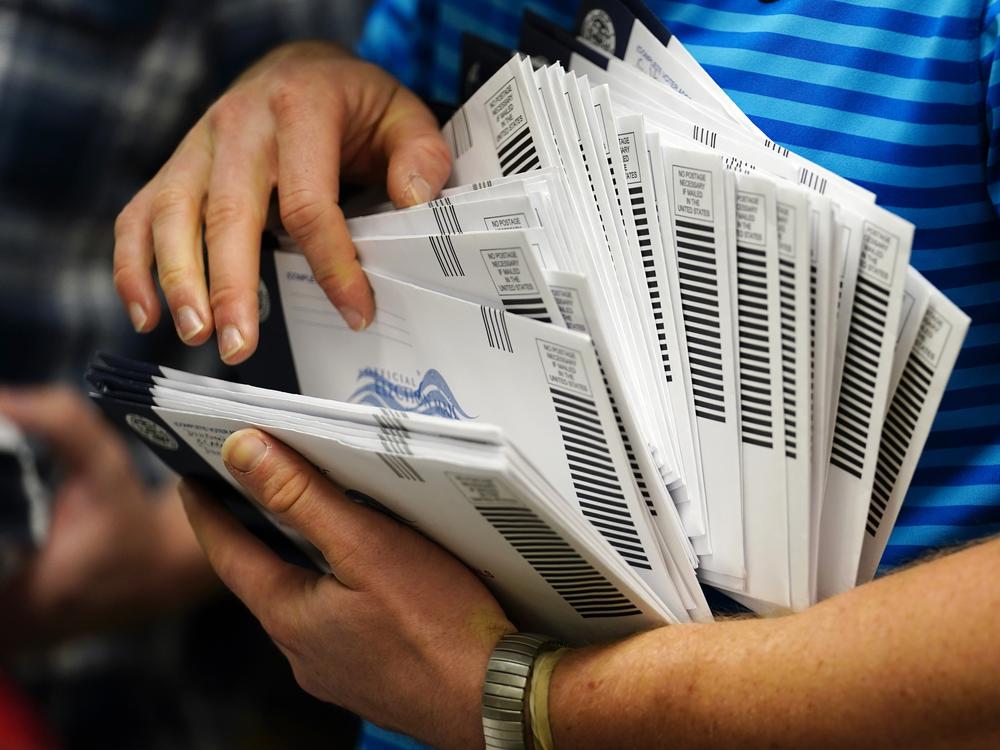Section Branding
Header Content
Legal questions about Pennsylvania mail-in ballots loom as voting starts
Primary Content
As voting begins for Pennsylvania’s general election, legal questions about the ballots of mail-in voters remain unresolved in the swing state that could determine the winner of the presidential race.
From what have become known as “undated ballots” to so-called “naked ballots,” the range of issues before state and federal courts center on what to do when voters return absentee ballots on time but don’t follow all of the rules for getting their votes counted.
State law requires completed mail-in ballots to be sent back in two envelopes — an inner secrecy envelope and an outer envelope. On that return envelope, voters have to add their signatures and the current date.
Election officials do not use that handwritten date to verify that a ballot was received by the legal deadline, but thousands of voters in recent elections have had ballots arrive on time but ultimately tossed for failure to properly date their outer envelopes.
Under state law, voters whose mail-in ballots are rejected can vote with a provisional ballot at a polling place. But in one Pennsylvania county, the Republican Party is trying to block the counting of provisional ballots of voters who returned mail-in ballots that were thrown out for not having secrecy envelopes.
Republican groups contend that the ballots of voters who have not followed the rules should not be counted, while voting rights groups have been arguing that state and federal laws protect eligible Pennsylvanians’ votes from getting disenfranchised because of a mistake.
In recent elections, Democrats have outnumbered Republicans in casting mail-in ballots, a method of voting that was opened to all registered voters in Pennsylvania in 2019 with bipartisan support at the time from the state’s lawmakers.
The state legislature’s bipartisan advisory board on election law has since recommended changing Pennsylvania’s rules. To “eliminate confusion and litigation” about mail-in ballots, the board wrote in a report last year, it called for rewriting state laws to say that not using a secrecy envelope or not having a handwritten date on the outer envelope would not disqualify a ballot.
But partisan gridlock has curtailed efforts to revise voting laws.
In the meantime, state officials have redesigned the envelopes to try to help voters identify the yellow secrecy envelopes and remember the date requirement.
And as the last day of voting draws closer, judges face a tight timeline for trying to resolve these lawsuits so that election offices have clear instructions on what to do with the ballots they receive. Officials are already under pressure from a state law that bans them from processing mail-in ballots until 7 a.m. ET on Election Day, potentially delaying the reporting of results.
Here’s where the major legal questions about Pennsylvania’s mail-in ballots stand:
Should “undated” and misdated ballots be counted?
No, the Pennsylvania Supreme Court ruled this month.
Citing procedural issues, the state’s highest court threw out a lower court ruling that had found not counting mail-in ballots in return envelopes without any handwritten date or with an incorrect one violates Pennsylvania’s constitution, which says that all elections in the state must be free and equal.
But on Wednesday, voting rights groups asked the Pennsylvania Supreme Court to take up the issue through a new lawsuit.
And there are similar legal fights in the federal courts that may affect what ultimately happens to these ballots. A federal judge is weighing an argument that excluding these ballots goes against the U.S. Constitution. Meanwhile, civil rights groups represented by the American Civil Liberties Union formally asked the U.S. Supreme Court on Friday to review whether not counting these ballots violates the Civil Rights Act of 1964, which says a person's right to vote cannot be denied for "an error or omission on any record or paper relating to any application, registration, or other act requisite to voting" that is "not material" in determining whether they’re qualified to vote.
Should the provisional ballots of voters who return “naked ballots” be counted?
Yes, the Commonwealth Court ruled this month.
The state court found that election officials in Pennsylvania’s Butler County, just north of Pittsburgh, should count the provisional ballots of two “naked ballot” voters, who cast them for this year’s primary election after officials notified them that their returned mail-in ballots were rejected for lacking secrecy envelopes.
But the Pennsylvania Supreme Court has agreed to take up an appeal by the Republican National Committee and the Republican Party of Pennsylvania. The GOP groups argue that counties contacting voters with defective mail-in ballots and allowing them to cast provisional ballots amounts to what’s known as a “notice and opportunity to cure” procedure, a process that’s separate from provisional voting. Counties in the state can choose to put in place notice-and-cure policies but, according to a 2020 Pennsylvania Supreme Court ruling in a different case, state courts are not allowed to order them.
In a separate but related court petition to the Pennsylvania Supreme Court, the GOP groups argue that counties across the state have “adopted a patchwork of notice-and-cure policies” and as a result, not uniformly carried out the state’s election rules, in violation of both the state and U.S. constitutions. The state’s high court has not yet announced whether it will take up that petition.
Edited by Benjamin Swasey

